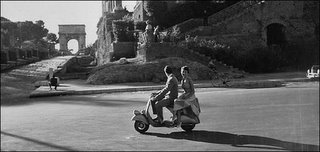
The New York Times had a intriguing treatise of the benefits and pitfalls of G.P.S. on Sunday by Ian Fisher, the paper's Rome correspondent.
The busy reporter added a global positioning system to his scooter so he could find his way through the labyrinth of Roman roads. Sounds like a good idea, right?
Here's the thing...
All of his friends in Rome argued that knowing exactly where you are isn't necessarily helpful. In fact, knowing where you are may, ironically, send you down the path to knowing a place less.
Here's why, according to Fisher:
"With my G.P.S., I can - and do - navigate blindly, simply turning when the reassuring voice tells me, in English, over the geeky get-up of earphones that snakes out of my helmet, to "Turn right in 400 meters." I do not need to see street signs. I trust the satellites overhead. It is a faith the Vatican, which I whiz by often, might respect for its strength, if not its source.
"As a result, you can't really get lost, which is also an argument against someone like me having G.P.S. in Italy.
Mr. Venturini talks about the enchantment of the "surprise" in Italy, a wine-glass-half-full way of saying that when you get lost, and you will, you can still enjoy yourself."The G.P.S. is also a technological subversion of Italian culture: Knowing full well that even they will get lost, Italians are always asking each other for directions, and giving them with great pleasure."
"With a G.P.S. you see things perfectly," Mr. Nicoletti, the radio personality, said. "But it's like a sphere that isolates you from the world. You take your world with you. If that's your aim, it's perfect. But the G.P.S., like all technical instruments, detaches you from human contact."
This isn't just a phenomena of ancient European cities. It's just as true in the Rockies. You want to get to know a place? Wander. Get lost. Leave the map and guide book at home. I think some of my best hiking experiences are those where I didn't know where I was going.
-Dave
No comments:
Post a Comment